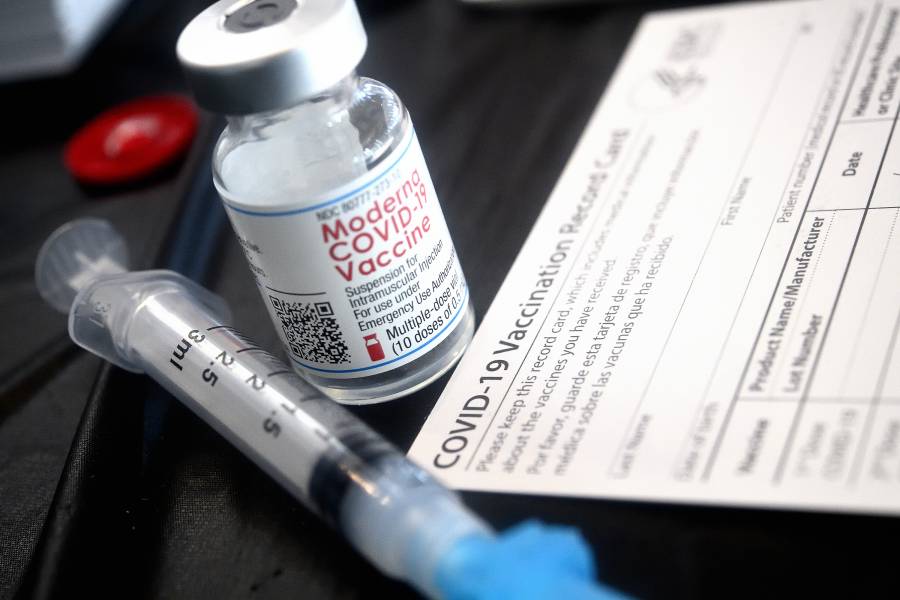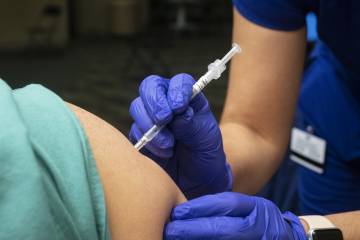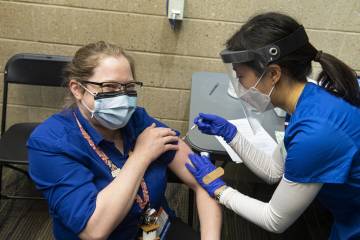- Name
- Doug Donovan
- dougdonovan@jhu.edu
- Office phone
- 443-997-9909
- Cell phone
- 443-462-2947
The Biden administration's recommendation that fully vaccinated Americans receive booster shots starting in September is being met by both support and skepticism from experts. President Biden made it clear during his announcement on Wednesday that current surges in COVID-19 cases remain centered predominantly among unvaccinated individuals, and that the Pfizer and Moderna vaccines still provide ample protection against severe illness, hospitalization, and death.
But research indicates that the vaccines' protection against mild and moderate disease has decreased enough that the President's team believes booster shots should be made freely available beginning Sept. 20 for those who have been fully vaccinated for eight months. That will make the boosters first available to the most vulnerable and the elderly, who have already achieved the highest vaccination coverage among all age groups.
"It's the best way to protect ourselves from new variants that could arise," Biden said Wednesday. "The plan is for every adult to get a booster shot eight months after you got your second shot."
William Moss, vaccinology lead for the Johns Hopkins Coronavirus Resource Center and executive director of the International Vaccine Access Center, discussed the announcement and the emerging support and skepticism about the administration's proposed strategy.
"There are folks who disagree and think this is a premature step," Moss said. "But the administration presented a reasonable argument based on new data on vaccine effectiveness and antibody responses. However, this plan is contingent upon authorization from the U.S. Food and Drug Administration and a recommendation for booster doses from the Advisory Committee on Immunization Practices and the Centers for Disease Control and Prevention."
For more insights, the CRC and the Hub teamed up for a conversation with Moss about what the benefits and challenges of vaccine boosters and how it might affect efforts to curb the pandemic.
Is this booster announcement a cause for concern about the pandemic?
It's a little worrisome, but there's also positive news in what they're saying.
We can't forget that their data shows that the protective efficacy of the vaccines against severe disease remains very high, even against the delta variant. Given that there is sustained effectiveness against severe disease it may be premature to call for booster doses.
But the administration may be assuming that the decreased effectiveness against mild and moderate symptoms that they're seeing could eventually translate into decreased effectiveness against severe disease. That is not necessarily the case. The vaccines may maintain prolonged efficacy against severe disease even if they are less effective at preventing mild disease that does not require hospitalization. But the administration may be taking this step out of an abundance of caution.
If a booster dose can improve protection, what's the harm?
I have no safety concerns about a booster shot. But this remains a pandemic of the unvaccinated. That's what is fueling this surge. President Biden said it: In Alabama, 90% of hospitalizations are among the unvaccinated. The number is 95% in Texas.
Getting more people vaccinated should be our No. 1, 2, and 3 priorities.
What concerns some is that a focus on administering boosters could distract from the work that still needs to be done to vaccinate the unvaccinated. But the administration thinks that booster doses will not distract from that mission and that there is sufficient vaccine supply to do boosters and standard vaccinations.
But we will see an increased demand for vaccines in the near future when children 5 to 11 years old become eligible.
The other argument against boosters is a moral one: Global vaccine inequity is a real and pressing problem. The United States is being criticized by World Health Organization officials who say high-income nations have the luxury of giving third shots when most people around the world haven't received a single dose. The disparities around the world are evident by looking at the Coronavirus Resource Center's international vaccination map.
The administration pointed out that the more than 100 million vaccine doses the nation has donated is more than all other nations combined. But it's still very small compared to the global need of about 11 billion doses. The U.S. can and should do more to address these global inequities and plans are in place to do so through additional donations and investment in manufacturing capacity. I have proposed that the U.S. donate 10 doses to COVAX Facility for every booster dose administered here.
What other concerns are there about starting a booster program now?
It does make sense to have boosters at some point for some groups of people, such as nursing home residents and older adults, because their immune systems grow weaker with age.
The big question is: Are boosters needed now? Is that eight-month window really necessary? That's not entirely clear. Any time window would be somewhat arbitrary but should be based on evidence and context, such as the risk of infection and severe disease.
We've never had an experience where a booster dose is needed this early after the primary vaccination series. This is a very short timeline for booster doses.
Plus, the booster dose may increase antibodies 10-fold, as health officials said. But the question remains: How long will that last? How long will a booster dose be protective?
It doesn't sound to me that this is being driven by a strategy to reduce transmission. It sounds like it's being driven by a strategy to reduce disease, which is important. But that argument has a weakness: we're not seeing evidence at this point that the efficacy against severe disease has decreased substantially. Vaccine protection against severe disease remains high.
The proposal is driven by the observation that, in some populations, efficacy against mild and moderate disease seems to have decreased. But it's not clear that that's going to translate into decreased efficacy against severe disease. To me that's their major underlying assumption. What they want to do is preempt that. They said they want to get out in front of the virus rather than get behind that. I interpreted that to mean they don't want to wait until we start seeing more severe disease due to breakthrough infections. One could argue that one could wait for that time and then roll out boosters, if that happens at all. Or if it happens in certain populations. But perhaps that is too late.











